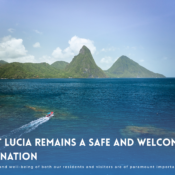Fairness and equality among SLHTA’s World Tourism Day pledges
In reaffirming the SLHTA’s commitment to ensuring that the island’s leading economic industry continues to reap tangible successes, SLHTA’s Chief Executive Officer, Noorani Azeez, said that emerging from the shocks threatening the crucial industry will need a rethink and collective resilience.
“Building our resilience to disruptions due to climate change and economic shocks are key to sustainable tourism development,” said Azeez. “As we rethink the future of tourism, fair pay, equal opportunity and community engagement in tourism activities will all help to foster such resilience.”
World Tourism Day has been held on September 27 every year since 1980. The date marks the anniversary of the adoption of the Statutes of the Organization in 1970, paving the way for the establishment of the United Nations World Tourism Organization (UNWTO) five years later.
The theme for this year’s observance is “Rethinking Tourism”, which SLHTA’s President, Paul Collymore, finds fitting given the economic fallout from the pandemic over the past two and a half years.
“This year’s theme is quite apt, as it causes us to reflect, refocus and reimagine tourism,” Collymore said. “Our recovery efforts over the past year forced us to build forward better….together. We are stronger and better working together. We are in a very good recovery mode with our airlift and stay-over arrivals, and the upcoming cruise season looks promising. Adversity continues to bring out the best in our collective efforts, making our people and business practices resilient.”
Meanwhile, Zurab Pololikashvili, Secretary-General of UNWTO, noted that “this year especially we also recognize that we cannot go back to the old ways of working.”
“Rethinking one of the world’s major economic sectors will not be easy,” Pololikashvili said. “But we are already well on the way. Crisis has inspired and catalyzed creativity. And the pandemic accelerated the transformation of work, bringing both challenges as well as enormous opportunities to ensure even more people get to benefit from tourism’s restart. We are also making significant progress in making tourism a central driver of the green, the blue and the digital economies, ensuring growth does not come at the expense of people or planet.”
Tourism is one of the world’s most important sectors, employing one in every ten people across the globe and providing hundreds of millions more with livelihoods. The industry primarily comprises five main groups of activities, namely transportation, accommodation, catering/retail, recreation, and travel-related services.
According to the Saint Lucia Tourism Authority (SLTA), Saint Lucia recorded more than 39,000 visitors in July this year, the most outstanding performance and the largest number of stay-over arrivals in any one-month period since the start of the COVID-19 pandemic. Moreover, the SLTA stated that, by the end of July, the island had recovered 80% of 2019 arrivals from global markets.
In Saint Lucia, nearly 15,000 people are directly employed in the tourism industry, with another 55,000 employed indirectly. The industry is the island’s largest and main source of employment, income and foreign exchange, and accounts for an estimated 65% of gross domestic product (GDP). In 2010, Saint Lucia generated almost US$771 million from internal tourism consumption, reaching about US$1.129 billion nearly 10 years later.
In observance of World Tourism Day on Tuesday, citizens are asked to wear blue.
Recent Posts
2026 Saint Lucia Jazz & Arts Festival Tickets ON SALE NOW!
Clarification and Reassurance following US Embassy’s Advisory
Tags





